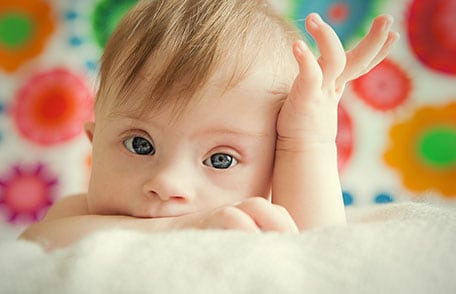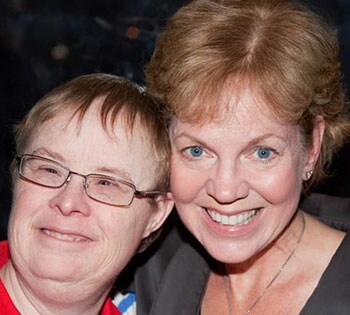
Down Syndrome

Down syndrome is a condition some babies are born with and have the rest of their lives. Even though people with Down syndrome might act and look similar, each person has different talents and the ability to thrive. Learn about Down syndrome and about Mark, an adult living with the condition. You can also learn what CDC is doing to improve the lives of people with Down syndrome.
What is Down Syndrome?
People with Down syndrome are born with an extra chromosome. Chromosomes are small “packages” of genes in all cells of the body. Genes are the body’s instruction manual, telling each of the cells what to do. Genes shape a person’s traits such as eye color, blood type, and risk of disease. Genes also determine how a baby’s body forms during pregnancy and how the baby ‘s body functions as it grows in the womb and after birth. Typically, a baby is born with 46 chromosomes. Babies with Down syndrome have an extra copy of one of these chromosomes, chromosome 21, and thus they have an extra copy of all of the genes packaged in chromosome 21. The extra genes cause all of the features of Down syndrome. A medical term for having an extra copy of a chromosome is “trisomy,” so another name for Down syndrome is trisomy 21.
How Many Babies Are Born with Down Syndrome?
About 1 in 700 babies are born with Down syndrome in the United States.1 That’s about 6,000 babies with Down syndrome born in the United States each year.
Mark’s Story
Employed, living independently, an active member of his community—it would have been hard to imagine that these words would ever describe Mark when he was born with Down syndrome in 1960. The doctor’s advice at the time was typical of the era. “Institutionalize him,” he said. “It’s best for your family.” Mark’s parents ignored that advice, took Mark home—and found a new doctor.
Mark’s family is justifiably proud of all that Mark has accomplished since then. The small town in Minnesota that Mark lived in didn’t have any educational opportunities to offer him, so initially he had to attend school in another town. Over time, the local school system was able to accommodate him. By the time Mark reached high school, he was included in some regular classes and participated in extracurricular activities, even serving as manager for the wrestling team—something that was practically unheard of at the time for a student with an intellectual disability.[289 KB] After high school, Mark moved into a brand new group home in town. Several years later, he moved into his own apartment. He has been living independently ever since, and working steadily at a local fast-food restaurant.
Mark leads a happy and worthwhile life, proud of his work and secure in the love of his family and friends. Every day, he tries to do his best in everything he doe—which, of course, inspires everyone around him to try to do the same.
CDC Activities to Improve the Lives of People with Down Syndrome
CDC’s National Center on Birth Defects and Developmental Disabilities (NCBDDD) works with partners to learn about Down syndrome. We track information about people with Down syndrome and do research to improve the lives of people with Down syndrome and their families.
- Tracking: Tracking where and when individuals with Down syndrome are born gives us important clues about opportunities to improve their health outcomes and help plan for services for them and their families.
- Research: To understand the impact that Down syndrome has on children and their families, CDC and its partners conduct studies on health service use, survival, and other conditions that people with Down syndrome might have, such as autism or Alzheimer disease.
- Improving the lives of individuals with Down syndrome: CDC provided funding to develop Brighter Tomorrows, an initiative to educate healthcare providers on how to counsel families of children with Down syndrome.
More Information
To learn more about Down syndrome, please visit
References
- Parker SE, Mai CT, Canfield MA, Rickard R, Wang Y, Meyer RE, Anderson P, Mason, CA, Collins JS, Kirby RS, Correa A, National Birth Defects Prevention Network. Updated national birth prevalence estimates for selected birth defects in the United States, 2004-2006. Birth Defects Res A Clin Mol Teratol. 2010;88:1008-16.

































No hay comentarios:
Publicar un comentario